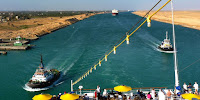A group of physical chokepoints – roads, ports and waterways – could disrupt the flow of world food trade, with drastic consequences.
The report, Chokepoints and Vulnerabilities in Global Food Trade, identifies fourteen chokepoints as critical to global food security. Eight are maritime waterways, including the Panama and Suez canals and the Turkish Straits, which link the Black Sea to the Aegean and Mediterranean.
There are three inland chokepoints, including the US inland waterways and Brazil’s road network, and three coastal ones, including the Black Sea ports and those on the US Gulf Coast.
The report draws on data included in a new interactive online database, available to those researching the global resource trade.
Laura Wellesley, co-author of the report, says: “The risks are growing as we all trade more with each other and as climate change takes hold. The oil industry has been mapping this sort of risk for years but it has been woefully overlooked in discussions of food security.
“Past events, including floods in Brazil and the southern US, and the export bans on wheat from the Black Sea countries that contributed in part to the Arab Spring, give us a flavor of the sort of disruptions that can occur when chokepoints are closed.”
Read more at World Food Trade Runs Chokepoint Gauntlet

No comments:
Post a Comment